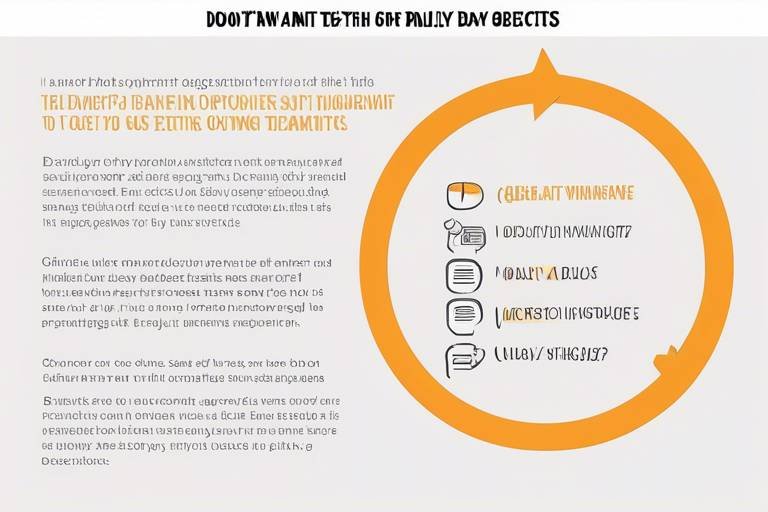How To Optimize Your Workflow with Time Tracking Apps
Are you tired of feeling overwhelmed by your workload, constantly struggling to meet deadlines, and wishing there were more hours in a day? Well, the good news is that with the help of time tracking apps, you can revolutionize the way you work, optimize your workflow, and take control of your time like never before.
Imagine having a tool that not only tracks the time you spend on each task but also provides valuable insights into your productivity patterns, helps you prioritize your to-dos effectively, and enables you to make data-driven decisions to boost your efficiency. That's the power of time tracking apps in action.
By incorporating time tracking apps into your daily routine, you can say goodbye to guesswork, procrastination, and wasted time. Instead, you can harness the potential of these apps to become more organized, focused, and proactive in managing your tasks and projects.
Whether you are a freelancer juggling multiple clients, a busy professional handling various responsibilities, or a student trying to balance studies and personal life, time tracking apps offer a versatile solution to enhance your time management skills and achieve your goals with precision.
So, if you are ready to supercharge your productivity, optimize your workflow, and unlock your full potential, it's time to dive into the world of time tracking apps and discover a new way of working that is efficient, effective, and tailored to your unique needs.
Benefits of Time Tracking Apps
Time tracking apps offer a multitude of benefits that can significantly enhance your productivity and efficiency. One of the key advantages is the increased accountability they provide. By tracking your time spent on various tasks and projects, you gain a clearer understanding of how you allocate your time and can hold yourself accountable for meeting deadlines and goals.
Another benefit of time tracking apps is the ability to improve task prioritization. By tracking the time you spend on different activities, you can identify which tasks are consuming the most time and adjust your priorities accordingly. This ensures that you focus on high-priority tasks and allocate your time effectively.
Additionally, time tracking apps enable you to have accurate time allocation for different projects. By tracking the time spent on each project or task, you can better estimate how long similar projects will take in the future. This helps in setting realistic deadlines, managing client expectations, and improving overall project management.
Choosing the Right Time Tracking App
Discover how time tracking apps can boost productivity, improve time management, and streamline your workflow. Learn about the benefits of using these apps and how to effectively integrate them into your daily routine.
Explore the various advantages of using time tracking apps, such as increased accountability, better task prioritization, and accurate time allocation for different projects.
When it comes to selecting the best time tracking app for your specific needs, there are several key factors to consider. You should evaluate the features offered by different apps, ensuring they align with your workflow requirements. Additionally, consider the compatibility of the app with your devices to ensure seamless integration. A user-friendly interface is crucial for a smooth experience, so opt for an app that is intuitive and easy to navigate. Integration with other tools, such as project management software or calendar apps, can further enhance the efficiency of your time tracking process.
Learn the essential steps to configure and customize your chosen time tracking app to suit your workflow, including creating categories, setting reminders, and generating reports.
Discover practical tips and strategies for maximizing the benefits of time tracking apps, such as setting realistic goals, analyzing time usage patterns, and adjusting your schedule accordingly.
Understand how to seamlessly integrate time tracking with task management tools to create a cohesive workflow that enhances efficiency, organization, and overall productivity.
Explore how time tracking apps can facilitate collaboration and team coordination by enabling shared project timelines, real-time updates, and transparent communication among team members.
Learn how to leverage the data collected from time tracking apps to identify bottlenecks, inefficiencies, and opportunities for improvement in your workflow and time management practices.
Discover the importance of establishing a feedback loop with your time tracking app to continuously refine your workflow, set new goals, and adapt to changing priorities for long-term productivity gains.
Setting Up Your Time Tracking App
Setting up your time tracking app is a crucial step in optimizing your workflow and maximizing productivity. To begin, you should first familiarize yourself with the features and settings of the app. Take the time to explore the various options available and customize them according to your specific needs and preferences.
One important aspect of setting up your time tracking app is creating categories for different types of tasks or projects. By organizing your time entries into specific categories, you can easily track how you spend your time and identify areas where you can improve efficiency.
Setting reminders within the app can also be beneficial in helping you stay on track with your time management goals. Whether it's a reminder to start a new task or to take a break, these notifications can keep you focused and disciplined throughout the day.
Generating reports from your time tracking app can provide valuable insights into your time usage patterns. By analyzing these reports, you can identify trends, pinpoint areas of improvement, and make informed decisions about how to better allocate your time in the future.
Furthermore, integrating your time tracking app with other tools and software that you use can enhance its functionality and streamline your workflow. Look for apps that offer seamless integration with task management tools, calendars, and communication platforms to create a cohesive work environment.
Effective Time Tracking Strategies
Effective time tracking is not just about clocking in and out; it's about utilizing the data gathered to enhance your productivity and time management skills. One strategy is to set realistic goals for your tasks and projects. By breaking down your work into manageable chunks and assigning specific timeframes, you can stay focused and motivated.
Another effective strategy is to analyze your time usage patterns regularly. Take a look at where your time is being spent each day and identify any areas where you may be wasting time or getting distracted. This awareness can help you make adjustments to your schedule and prioritize tasks more effectively.
Adjusting your schedule based on your time tracking data is crucial. By adapting your routine according to the insights gained from your time tracking app, you can optimize your workflow and ensure that you are making the most of your time. This may involve shifting tasks around, setting aside dedicated time for specific activities, or eliminating time-wasting habits.
Furthermore, it's essential to incorporate regular breaks into your workday. Time tracking apps can help you track your work intervals and remind you to take short breaks to recharge and maintain focus. By incorporating these breaks into your schedule, you can prevent burnout and improve your overall productivity.
Lastly, utilize the reporting features of your time tracking app to gain valuable insights into your productivity trends. Generating reports on your time allocation, task completion rates, and efficiency levels can provide you with a comprehensive overview of your work habits. Use this data to make informed decisions about how to optimize your workflow and make better use of your time.
Integrating Time Tracking with Task Management
Integrating time tracking with task management is like combining the precision of a Swiss watch with the flexibility of a well-oiled machine. By synchronizing these two essential elements of productivity, you can create a harmonious symphony of efficiency in your daily workflow. Imagine a conductor leading an orchestra, each section playing in perfect harmony to produce a masterpiece - that's the level of coordination you can achieve by integrating time tracking with task management.
When you seamlessly blend time tracking with task management tools, you create a unified system that not only helps you stay on top of deadlines but also allows you to allocate your time wisely. It's like having a personal assistant who not only reminds you of important tasks but also ensures that you allocate the right amount of time to each one. This integration eliminates the guesswork and ensures that you make the most out of every minute in your workday.
Furthermore, by integrating time tracking with task management, you can easily identify where your time is being spent and make adjustments as needed. It's like shining a spotlight on your daily activities, allowing you to see where you may be wasting time or where you could be more efficient. This insight empowers you to make informed decisions about how to prioritize your tasks and optimize your workflow for maximum productivity.
Imagine a well-oiled machine where every cog works in perfect harmony, each task seamlessly flowing into the next with precision and efficiency. That's the kind of workflow you can achieve by integrating time tracking with task management. It's not just about managing your time better; it's about transforming the way you work, creating a streamlined process that allows you to focus on what truly matters and achieve your goals with ease.
Collaboration and Team Time Tracking
Collaboration and Team Time Tracking play a crucial role in enhancing productivity and fostering effective teamwork within an organization. By utilizing time tracking apps that support collaborative features, teams can streamline communication, coordinate tasks efficiently, and achieve project milestones with greater ease. These apps enable team members to access shared project timelines, view real-time updates on task progress, and communicate transparently about project requirements and deadlines.
Furthermore, team time tracking apps promote accountability and visibility, allowing team leaders to monitor individual contributions, identify bottlenecks in project workflows, and allocate resources effectively. By centralizing time data and project information, these apps facilitate seamless collaboration among team members, regardless of their physical location or time zone, promoting a cohesive work environment and driving collective success.
Through the integration of collaboration features with time tracking functionalities, teams can synchronize their efforts, align their priorities, and work towards common goals more effectively. By leveraging the insights gained from team time tracking data, organizations can optimize resource allocation, refine project timelines, and enhance overall team performance, leading to increased efficiency and project success.
Analyzing Time Data for Improvement
When it comes to optimizing your workflow, one of the most valuable tools at your disposal is the data collected by time tracking apps. By analyzing this data effectively, you can gain valuable insights into how you spend your time, identify areas for improvement, and make informed decisions to enhance your productivity.
One key aspect of analyzing time data is understanding where your time is being allocated. By categorizing your activities and tasks within the time tracking app, you can see exactly how much time you are spending on different projects, clients, or activities. This detailed breakdown can reveal patterns and trends that may not be immediately apparent, allowing you to make strategic adjustments to your schedule.
Furthermore, time tracking apps often provide reporting features that allow you to generate customized reports based on your tracked data. These reports can offer a comprehensive overview of your time usage, highlighting areas where you may be spending too much time or where you could be more efficient. By regularly reviewing these reports, you can gain a deeper understanding of your work habits and make data-driven decisions to optimize your workflow.
In addition to tracking your own time, analyzing time data can also be beneficial for team collaboration and project management. By sharing time tracking data with team members, you can foster transparency and accountability within the team. This shared data can help identify potential bottlenecks, allocate resources more effectively, and ensure that everyone is working towards common goals.
Moreover, analyzing time data can reveal inefficiencies in your workflow and highlight areas where you may need to make changes. For example, if you consistently find that you are spending an excessive amount of time on certain tasks, it may be time to reevaluate your approach or consider delegating those tasks to others. By continuously monitoring and analyzing your time data, you can proactively address issues and make continuous improvements to your workflow.
Continuous Improvement and Feedback Loop
Continuous improvement is a key component of any successful workflow. By establishing a feedback loop with your time tracking app, you can continuously refine your processes and enhance productivity over time. This feedback loop involves analyzing the data collected from the app to identify areas for improvement, whether it be bottlenecks in your workflow, inefficiencies in time management, or opportunities for optimization.
Through consistent analysis of the data provided by the time tracking app, you can gain valuable insights into how you are spending your time and where adjustments can be made. This data-driven approach allows you to make informed decisions about how to better allocate your time, set new goals, and adapt to changing priorities.
Furthermore, the feedback loop created by the time tracking app enables you to track your progress over time and measure the impact of any changes you implement. By monitoring your performance and productivity trends, you can make data-driven decisions to drive continuous improvement in your workflow.
Frequently Asked Questions
- What are the key benefits of using time tracking apps?
Time tracking apps offer numerous benefits, including increased accountability, better task prioritization, and accurate time allocation for different projects. They help individuals and teams stay organized, focused, and productive by providing insights into how time is spent throughout the day.
- How do I choose the right time tracking app for my needs?
When selecting a time tracking app, consider factors such as features, compatibility with your devices, user interface design, and integration capabilities with other tools you use. Look for an app that aligns with your workflow and provides the functionalities you require to effectively manage your time.
- What are some effective time tracking strategies to enhance productivity?
Effective time tracking strategies involve setting realistic goals, analyzing time-usage patterns to identify inefficiencies, and adjusting your schedule accordingly. By leveraging the data collected from time tracking apps, you can optimize your workflow, prioritize tasks, and make informed decisions to boost productivity.
- How can time tracking apps help with collaboration and team coordination?
Time tracking apps facilitate collaboration and team coordination by enabling shared project timelines, real-time updates, and transparent communication among team members. They allow teams to track progress, allocate resources efficiently, and ensure everyone is aligned towards common goals.
- What is the significance of analyzing time data for workflow improvement?
Analyzing time data collected from tracking apps helps identify bottlenecks, inefficiencies, and areas for improvement in your workflow and time management practices. By leveraging this data, you can make informed decisions, streamline processes, and optimize your productivity for better outcomes.


















